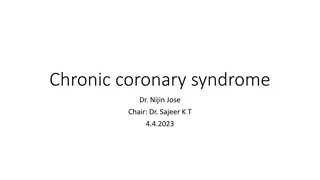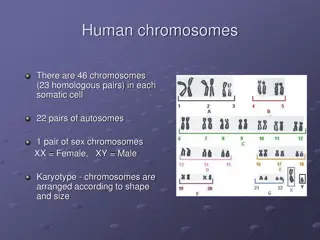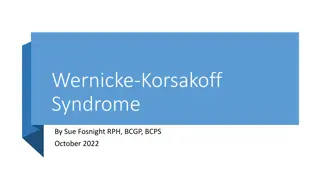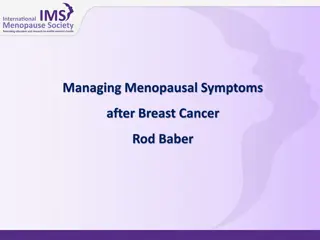Understanding Menopausal Concerns in Women with Down Syndrome
Women with Down Syndrome may experience menopause earlier than the general population, around the age of 46 on average. It's important for parents to prepare their daughters with DS for the physical and emotional changes that come with menopause. Communication, awareness, and support play key roles in helping individuals navigate through this life stage. Menopause for women with DS follows similar stages and symptoms as in other women, including hot flushes, tiredness, mood swings, and more. Early preparation and open dialogue can ease the transition and ensure proper symptom management.
Download Presentation

Please find below an Image/Link to download the presentation.
The content on the website is provided AS IS for your information and personal use only. It may not be sold, licensed, or shared on other websites without obtaining consent from the author. Download presentation by click this link. If you encounter any issues during the download, it is possible that the publisher has removed the file from their server.
E N D
Presentation Transcript
Preparing your daughter for changes Menopausal concerns in women with Down Syndrome (DS)
Preparing your daughter for changes. Note from a mother... Parents of a special-needs child often feel like their world has turned upside down during the difficult days of PMS & bleeding. Menopause comes with it s own set of challenges for any woman. Each woman may experience menopause with varying intensity & duration. Here are some things you can do ahead of time to prepare for the transition: Teach them that this is a normal aspect of having a female body! Like mummy! The more we prepare our children, ourselves for these changes & help them understand that they will be okay, the easier the transition for her! So what s a good way to teach your daughter about Menopause? Awareness & open communication about her experiences through her journey.
Menopause & DS Symptoms Management Dos & Don'ts Support What is menopause? Menopause may occur when a woman s ovaries stop producing eggs each month & the hormones required for fertility in a woman. As a result her menstrual cycle stops. This happens as a result of normal/natural changes in sexual hormones that comes with age. Menopause is said to have taken place if a woman has not had a regular menstrual cycle for 12 months or more. Helping your child acknowledge & accept these changes is essential.
Menopause & DS Symptoms Management Dos & Don'ts Support When do women with DS attain menopause? In most cases, women with DS reach menopause earlier than is seen in the general population. The average age for women to reach menopause in the general population is 51 years. Women with DS reach menopause at an average of 46 years of age. Please note that menopause in women with DS may happen up to ten years earlier than in the general population.
Menopause & DS Symptoms Management Dos & Don'ts Support Is menopause different for women with Down s syndrome (DS)? NO. Women with DS will go through the same stages of menopause and experience the same symptoms as any other woman There are three stages 1. Peri-menopause 2. Menopause 3. Post-menopause The only difference may lie in the age on onset of pre-menopausal symptoms.
Menopause & DS Symptoms Management Dos & Don'ts Support What are the symptoms of menopause in women with DS? At any time in these stages a woman may experience any of the following symptoms: Hot flushes Tiredness Aches and pains Weight gain & food cravings Depression & mood swings Changes in skin & hair condition Helping your child identify & communicate these signs is imperative.
Menopause & DS Symptoms Management Dos & Don'ts Support Handling emotional distress during menopause Often the emotional symptoms of menopause maybe dismissed as challenging behaviour caused by the woman s learning disability, rather than being correctly diagnosed as signs of early menopause. This difficulty can be compounded by the fact that women with DS often have trouble communicating their symptoms. They are often not aware of what entails a hot flush . It may be difficult to tell the difference between a flush and feeling hot due to the weather.
Menopause & DS Symptoms Management Dos & Don'ts Support Being prepared for menopause before it happens. The better informed a woman the more aware she will be of the signs of menopause Women who also have a learning disability need specific, clear and unambiguous information to understand menopause & its changes. As menopausal symptoms can be so varied, woman of this age group must undergo a general medical assessment to rule out other medical causes, such as thyroid fluctuations, vitamin deficiencies or depression. Book an appointment with an Endocrinologist to rule out other hormonal imbalances.
Menopause & DS Symptoms Management Dos & Don'ts Support Can menopause be treated through medical intervention? Most women will not need treatment for menopause but if a woman has symptoms that she is unable to cope with then the Gynaecologist may refer her to a psychiatrist to help manage her emotions better. But, Meeting a psychiatrist need not lead to treatment of her symptoms through medications. Regular counselling sessions can also go a long way to help manage emotions effectively.
Menopause & DS Symptoms Management Dos & Don'ts Support Can nutrition and a healthy lifestyle help with menopause management? A healthy and balanced diet may help when women are experiencing menopausal symptoms. This can also help with, Overall weight reduction Reducing food cravings Reducing tiredness Hot flushes Mood swings
Menopause & DS Symptoms Management Dos & Don'ts Support Dos & Donts to handle menopause Steer clear of, highly processed (junk) salty foods spicy foods (promote hot flushes) Adopt healthy eating habits, such as, A diet rich in fresh fruit and vegetables (e.g. apples, plums, broccoli, carrots, beans, peas, potatoes, and mushrooms) Foods rich in plant oestrogens (e.g. Soya-made products : Tofu, milk, curd or supplements) Nuts and seeds, pulses like chickpeas, lentils, aduki and mung beans. Consuming a hot drink to soothe bodily discomfort.
Menopause & DS Symptoms Management Dos & Don'ts Support Dos & Donts to handle menopause Keep physically active Regular physical exercise helps prevent fatigue and reduce mood changes. Aerobics, dance, yoga are good exercises to make a habit. Exercise releases endorphins, which relieves stress to improves mood & sleep. Reduced physical activity will make one sluggish, lethargic and dull, which we certainly don t want to be when dealing with mood changes that come with Menopause.
Menopause & DS Symptoms Management Dos & Don'ts Support Dos & Donts to handle menopause Keep the mind busy with creative engagements Arts & crafts can uplift anyone in low spirits Seeing the hard-earned results of creative projects can improve mood fluctuations in an individual. Try cooking, baking, or anything else that involves active planning & execution. The right kind of background music can ease breathing help one relax. Find out what particular situations help your daughter relax. The idle mind is a bored mind & not a happy one at that.
Menopause & DS Symptoms Management Dos & Don'ts Support We are here to help! Nayi Disha & DSFI s parent communities are here for all your doubts regarding menopause. To join the parent community &/or for more information, write to us: contactus@nayi-disha.org & visit www.nayi-disha.org for resources on Menstrual care & health of your child.
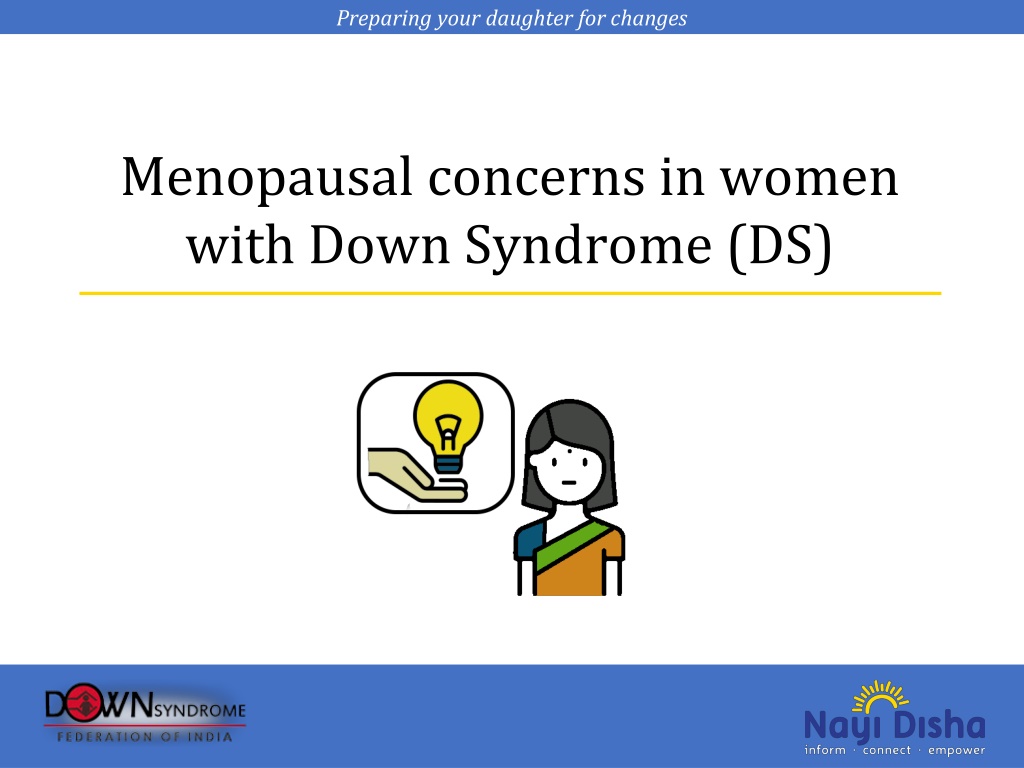


![❤[PDF]⚡ Zee Zee Does It Anyway!: A Story about down Syndrome and Determination](/thumb/20462/pdf-zee-zee-does-it-anyway-a-story-about-down-syndrome-and-determination.jpg)






